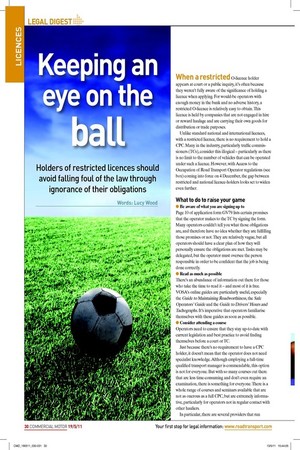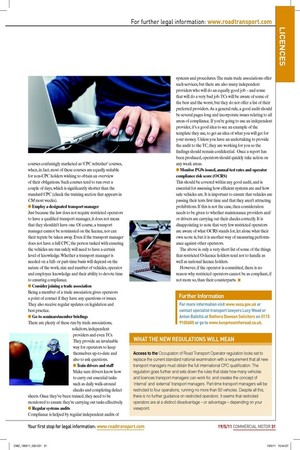Keeping an eye on the
Page 20

Page 21

If you've noticed an error in this article please click here to report it so we can fix it.
ball
Holders of restricted licences should avoid falling foul of the law through ignorance of their obligations
Words: Lucy Wood When a restricted O-licence holder appears at court or a public inquiry, it’s often because they weren’t fully aware of the significance of holding a licence when applying. For would-be operators with enough money in the bank and no adverse history, a restricted O-licence is relatively easy to obtain. This licence is held by companies that are not engaged in hire or reward haulage and are carrying their own goods for distribution or trade purposes.
Unlike standard national and international licences, with a restricted licence, there is no requirement to hold a CPC. Many in the industry, particularly traffic commissioners (TCs), consider this illogical – particularly as there is no limit to the number of vehicles that can be operated under such a licence. However, with Access to the Occupation of Road Transport Operator regulations (see box) coming into force on 4 December, the gap between restricted and national licence-holders looks set to widen even further.
What to do to raise your game
● Be aware of what you are signing up to Page 10 of application form GV79 lists certain promises that the operator makes to the TC by signing the form. Many operators couldn’t tell you what those obligations are, and therefore have no idea whether they are fulfilling those promises or not. They are relatively vague, but all operators should have a clear plan of how they will personally ensure the obligations are met. Tasks may be delegated, but the operator must oversee the person responsible in order to be confident that the job is being done correctly.
● Read as much as possible There’s an abundance of information out there for those who take the time to read it – and most of it is free. VOSA’s online guides are particularly useful, especially the Guide to Maintaining Roadworthiness, the Safe Operators’ Guide and the Guide to Drivers’ Hours and Tachographs. It’s imperative that operators familiarise themselves with these guides as soon as possible.
● Consider attending a course Operators need to ensure that they stay up-to-date with current legislation and best practice to avoid finding themselves before a court or TC.
Just because there’s no requirement to have a CPC holder, it doesn’t mean that the operator does not need specialist knowledge. Although employing a full-time qualified transport manager is commendable, this option is not for everyone. But with so many courses out there that are less time-consuming and don’t even require an examination, there is something for everyone. There is a whole range of courses and seminars available that are not as onerous as a full CPC, but are extremely informative, particularly for operators not in regular contact with other hauliers.
In particular, there are several providers that run courses confusingly marketed as ‘CPC refresher’ courses, when, in fact, most of these courses are equally suitable for non-CPC holders wishing to obtain an overview of their obligations. Such courses tend to run over a couple of days, which is significantly shorter than the standard CPC (check the training section that appears in CM most weeks).
● Employ a designated transport manager Just because the law does not require restricted operators to have a qualified transport manager, it does not mean that they shouldn’t have one. Of course, a transport manager cannot be nominated on the licence, nor can their repute be taken away. Even if the transport manager does not have a full CPC, the person tasked with ensuring the vehicles are run safely will need to have a certain level of knowledge. Whether a transport manager is needed on a fullor part-time basis will depend on the nature of the work, size and number of vehicles, operator and employee knowledge and their ability to devote time to ensuring compliance.
● Consider joining a trade association Being a member of a trade association gives operators a point of contact if they have any questions or issues. They also receive regular updates on legislation and best practice.
● Go to seminars/member briefings There are plenty of these run by trade associations, solicitors, independent providers and even TCs. They provide an invaluable way for operators to keep themselves up-to-date and also to ask questions.
● Train drivers and staff Make sure drivers know how to carry out essential tasks such as daily walk-around checks and completing defect sheets. Once they’ve been trained, they need to be monitored to ensure they’re carrying out tasks effectively.
● Regular systems audits Compliance is helped by regular independent audits of systems and procedures. The main trade associations offer such services, but there are also many independent providers who will do an equally good job – and some that will do a very bad job. TCs will be aware of some of the best and the worst, but they do not offer a list of their preferred providers. As a general rule, a good audit should be several pages long and incorporate issues relating to all areas of compliance. If you’re going to use an independent provider, it’s a good idea to see an example of the template they use, to get an idea of what you will get for your money. Unless you have an undertaking to provide the audit to the TC, they are working for you so the findings should remain confidential. Once a report has been produced, operators should quickly take action on any weak areas.
● Monitor PG9s issued, annual test rates and operator compliance risk score (OCRS) This should be covered within any good audit, and is essential for assessing how efficient systems are and how safe vehicles are. It is important to ensure that vehicles are passing their tests first time and that they aren’t attracting prohibitions. If this is not the case, then consideration needs to be given to whether maintenance providers and/ or drivers are carrying out their checks correctly. It is disappointing to note that very few restricted operators are aware of what OCRS stands for, let alone what their own score is, but it is another way of measuring performance against other operators.
The above is only a very short list of some of the things that restricted O-licence holders tend not to handle as well as national licence holders.
However, if the operator is committed, there is no reason why restricted operators cannot be as compliant, if not more so, than their counterparts. ■









































